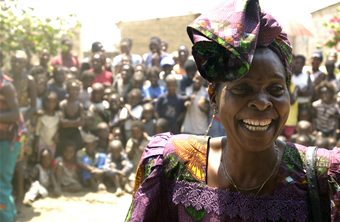
Reportage
Ambitious targets set in Malawi
15 décembre 2006
15 décembre 200615 décembre 2006

Photo credits : UNAIDS/C. Giray
In Malawi, the involvement of civil society in the process of setting targets for universal access to HIV prevention, treatment, care and support has resulted in ambitious targets addressing the needs and expectations of those living with or affected by HIV.
“Malawi is well on the way to endorsing targets,” said Desmond Johns, UNAIDS country coordinator in Malawi. “We’ve seen a process with limited civil society involvement grow into a process with meaningful dialogue and participation. All of this is producing a much better end result,” he added.
The process of setting targets for universal access in Malawi began early in 2006 when a small group of partners made up of representatives from the national ministries, donor organizations, the United Nations and non-governmental organizations met to identify the objectives and challenges to scaling up the country’s national response. Only two national and two international civil society umbrella organizations took part to this initial consultation.
Noting the limited role attributed to national civil society at this stage, a group of 20 organizations, led by Action Aid and the National Association of People Living with HIV & AIDS in Malawi (NAPHAM), decided in March 2006 to form a coalition in order to articulate a stronger position on the question of universal access. Starting a parallel process, the coalition undertook to review and if necessary challenge the preliminary targets set by the working groups.
The incentive to combine both processes and establish a truly inclusive mechanism to set targets for scaling up the response to AIDS came after the Global Fund review in June and July which revealed that many of the targets established by the working groups had already been exceeded.
“We were in presence of two parallel processes which did not communicate and could not benefit from each other’s strengths,” said Johns. “This situation underlined how important it is to bring all stakeholders around the same table. As of October, this became UNAIDS priority,” he added.
A three-day consultation was held soon after which brought together 350 participants from a wide range of stakeholders. Sixteen representatives from faith and community based organizations and groups of people living with HIV gave presentations on their experiences and the challenges they faced in responding to the epidemic in their communities. The presentations added a new and fresh perspective to the discussions.
In November consultations were extended to the provincial and district levels to ensure the widest possible participation. An international consultant facilitated the discussions to give everyone an opportunity to contribute. He also arranged to seek and incorporate the views of those who could not attend the meetings and gave them time to review the targets and submit comments before they were consolidated.
“We finally felt that our voices were being heard and taken into account,” said Sembereka from Malawi Network of Religious Leaders living with or Personally affected by HIV and AIDS, and member of the secretariat of the Civil Society coalition on Universal Access. “We represent people living with or affected by HIV and this is an unprecedented opportunity to make a difference in the response to HIV. There remains a lot of room for improving civil society participation. Our contribution should be an integral part of planning and monitoring the scale up of the response to AIDS,” he added.
The final national level stakeholder meeting took place on 29 November to communicate the proposed targets and the revised and costed National Action Framework. The targets are due to be endorsed by a Cabinet of Ministers before the end of the year.
“The inclusive process in November was an opportunity to bring a greater level of ambition to the universal access targets, develop consensus and build ownership of the targets and to prioritize and cost the National AIDS Framework, so that it would constitute the implementation plan for Universal Access. This is a great example of the Global Task Team recommendations and Paris Declaration actually taking life,” concluded UNAIDS Country Coordinator Desmond Johns.
Reportages connexes
 Supprimer les inégalités dangereuses
Supprimer les inégalités dangereuses
18 novembre 2022
